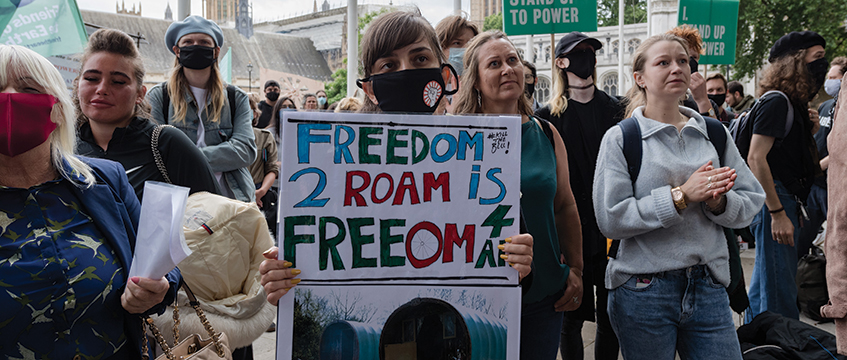Louise Clark analyses an important decision on the power of courts to grant injunctions against unknown persons.
Key points
- The court’s powers are sufficiently flexible to extend to the grant of newcomer injunctions
- They can be a valuable and proportionate remedy provided that there are appropriate safeguards to protect newcomers’ rights
In Wolverhampton City Council and others v London Gypsies and Travellers and others [2023] UKSC 47; [2023] PLSCS 197, the Supreme Court has clarified the court’s powers to grant injunctions against unknown persons – or newcomers – who at the date of grant have not yet performed, or even threatened to perform, the acts which the injunction prohibits and the procedural safeguards required to protect newcomers’ rights.
The appeal arose in the context of unlawful encampments by Gypsies and Travellers but the decision has wider significance because newcomer injunctions have become increasingly important in a variety of contexts, including industrial picketing, environmental and other protests and unlawful activities related to social media.
Background
The case concerned several conjoined cases in which local authorities sought injunctions to prevent unauthorised encampments by Gypsies and Travellers who were unidentifiable when the injunctions were sought and granted and described as “persons unknown”. Such claims were brought both under section 187B of the Town and Country Planning Act 1990, which allows the court to grant an injunction to restrain an actual or anticipated breach of planning control, and in common law trespass.
Between 2015 and 2020, 38 different local authorities obtained such injunctions without notice to any other party, at hearings where Gypsies and Travellers were not represented. From mid-2020, the local authorities sought to extend or vary such injunctions which were coming to an end. This led the High Court to review all such injunctions and the appellants were permitted to intervene to represent the interest of Gypsies and Travellers.
In Barking and Dagenham London Borough Council v Persons Unknown [2021] EWHC 1201 (KB), the judge concluded that while the court could grant interim injunctions against persons unknown, final injunctions could only be granted against identified parties who had had an opportunity to contest the final order. The Court of Appeal allowed the council’s appeal ([2022] EWCA Civ 13; [2022] EGLR 9). The appellants appealed to the Supreme Court.
The law
The court’s power to award an injunction is equitable in origin and confirmed by parliament in section 37 of the Senior Courts Act 1981, which provides that the High Court may by order – whether interlocutory or final – grant an injunction in all cases in which it appears to the court to be just and convenient to do so. The power is unlimited but must be exercised in accordance with equitable principles and any restrictions established by precedent and rules of court.
Such principles and practices evolve over time as circumstances change: the development of the freezing injunction, search order, third-party disclosure order and anti-suit injunction are examples of innovations over the last 50 years, designed to protect and enhance the administration of justice and substantive rights.
New type of injunction
The Supreme Court analysed the authorities over the last 20 years and concluded that there is no reason newcomer injunctions should not be granted, in principle. It is a wholly new type of injunction with no very closely related ancestor. Their distinguishing features are that they are made:
(i) against persons truly unknowable at the date of grant;
(ii) always on a without notice basis;
(iii) where those restrained are unlikely to have a right to do the thing prohibited;
(iv) where there is unlikely to be any real dispute or triable issue of fact or law;
(v) where the newcomers are unlikely to engage as active defendants;
(vi) where the mischief at issue is short term and repeatable locally so that usual processes are inadequate;
(vii) where the injunction is sought for its medium to long-term effect as a means of holding the ring in an emergency; and
(viii) where the purpose is to provide a more effective or the only effective remedy.
The Supreme Court was satisfied that the court has power to grant such injunctions, without notice and whether interim or final, and that where certain conditions are satisfied the exercise of that power is an appropriate exercise of the court’s equitable discretion.
The application and protection for newcomers’ rights
While the applicable principles and safeguards will evolve over time, the grant of a newcomer injunction in the context of trespass and breach of planning control by gypsies and travellers will likely require an applicant to do the following:
1. Demonstrate a compelling need to protect civil rights or enforce public laws which are not adequately met by any other available remedies.
2. Build into the application and order sought procedural safeguards, including:
(i) widely advertising an application so that those likely to be affected are given a fair opportunity to make representations before the injunction is made;
(ii) displaying the order in a prominent location at the affected site;
(iii) clearly notifying newcomers who become aware of the order of their right to apply to court to have it varied or set aside without having to show that circumstances have changed; and
(iv) temporal and geographical limits on the scope of the order to ensure that it is proportionate.
3. Comply with a strict duty requiring them to disclose to the court any matter which a newcomer might raise to oppose the making of the order.
4. Satisfy the court that, on the particular facts of the case, it is just and convenient that a newcomer injunction is granted.
Louise Clark is a property law consultant and mediator











